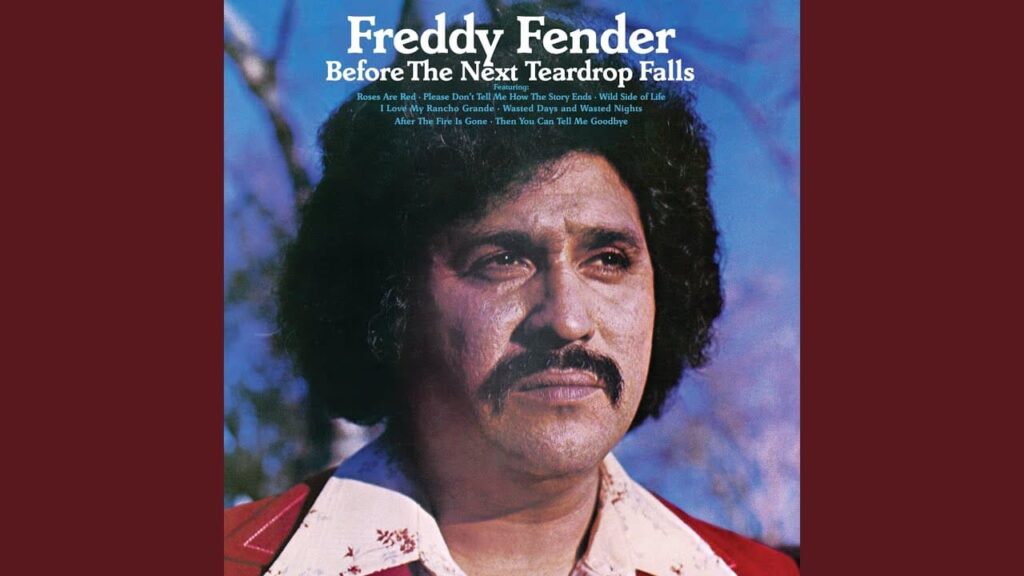
The Bitter Echoes of Lost Time: A Haunting Lament for Missed Chances and Unfulfilled Affections
Freddy Fender‘s iconic and profoundly melancholic ballad, “Wasted Days And Wasted Nights”, carries a fascinating history, becoming a belated but immense success that ultimately soared to the coveted number 1 spot on the Billboard Hot Country Singles chart in July 1975, and impressively crossed over to reach number 8 on the Billboard Hot 100 pop chart. This wasn’t merely a hit; it was a powerful resurgence, a testament to Fender‘s distinctive Tex-Mex vocal style and his remarkable ability to infuse deep heartache and regret into every syllable. While originally recorded by Fender in 1959, its true moment of widespread recognition came much later, after his release from prison and a career resurgence. Featured on his breakthrough album, “Before the Next Teardrop Falls” (released in 1975, which topped the Billboard Top Country Albums chart and reached number 20 on the Billboard 200), “Wasted Days And Wasted Nights” became an instant classic, beloved for its raw honesty and its universal theme of regret over lost opportunities. It solidified Fender‘s reputation as a unique and soulful voice, appealing to millions who understood the pain of squandered moments.
The story behind “Wasted Days And Wasted Nights” is as compelling as the song itself, deeply intertwined with Freddy Fender‘s personal journey. He wrote and first recorded the song in 1959, early in his career, hoping it would be his breakthrough hit. However, shortly after its initial release, Fender (born Baldemar Huerta) was arrested on marijuana charges and spent several years in prison. His promising career was abruptly halted. Upon his release in the early 1970s, he struggled to regain his footing. It wasn’t until producer Huey P. Meaux convinced him to re-record “Wasted Days And Wasted Nights” as the B-side to “Before the Next Teardrop Falls” that destiny finally intervened. The song, a poignant reflection on time lost and opportunities missed, gained traction organically, becoming a massive hit in its own right and ironically launching the career it was initially meant to establish. The narrative perfectly encapsulates the regret of a love that was either ignored, misunderstood, or simply allowed to slip away, and the bitter knowledge that time can never be regained.
The meaning of “Wasted Days And Wasted Nights” is a profound and deeply melancholic lament for time irrevocably lost, particularly in the context of a relationship that was either neglected, unfulfilled, or ended prematurely. It’s a song about the bitter pang of regret that comes from realizing the precious moments and opportunities with a loved one have been squandered, leaving behind a haunting emptiness. The lyrics convey a pervasive sense of sorrow and helplessness, as the speaker acknowledges the irreversible nature of their past choices and the emotional cost of their “wasted” time. Lines like “Wasted days and wasted nights / I’ve been wasted all alone / Since you left me here to roam” succinctly capture the core sentiment, linking the passage of time directly to the pain of separation and loneliness. It speaks to the universal human experience of looking back with sorrow on missed chances, the yearning for what could have been, and the profound ache of knowing that some moments, once gone, can never truly be reclaimed, leaving behind only the echoing emptiness of regret.
Freddy Fender‘s vocal performance on “Wasted Days And Wasted Nights” is simply iconic. His distinctive Tex-Mex delivery, a beautiful blend of country twang and rhythm and blues inflection, imbues the song with an unparalleled sense of soulful anguish and resigned sorrow. His voice, raw and authentic, makes the listener feel the weight of every lost moment and every tear shed. The arrangement is sparse yet incredibly effective, built around a gentle, almost weeping, steel guitar, a subtle piano, and a steady, understated rhythm section that allows Fender‘s emotive vocal to remain the absolute centerpiece. This minimalist production perfectly captured the song’s intimate pain, allowing its heartfelt message to resonate deeply with a broad audience. Its success, particularly given its belated nature, further cemented Fender‘s reputation as a true survivor and a unique voice in American music, capable of bridging cultural and musical divides with his singular talent.
Listening to “Wasted Days And Wasted Nights” today evokes a particular kind of profound nostalgia, transporting us back to a time when a song could carry the weight of an artist’s personal journey and resonate with universal human experiences of regret and longing. It reminds us of Freddy Fender‘s unique vocal artistry and his ability to turn personal pain into a shared lament. For those of us who recall its pervasive presence on the airwaves, this song remains a timeless anthem for missed opportunities, a beautiful yet sorrowful testament to the indelible mark that unfulfilled love and wasted time can leave. It’s a cherished melody that, even after all these years, continues to whisper its poignant truth, gently reminding us of the preciousness of each moment and the bitter echo of “wasted days and wasted nights.”